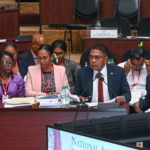─ persons still urged to take necessary precautions against extreme exposure to heat
During July and August are considered the hottest weather periods in the Caribbean region. However, Chief Hydrometeorological Officer, Dr. Garvin Cummings within the Agriculture Ministry has advised that there is likely to be no severe heat impact over the next month.
During a telephone interview, Dr. Cummings explained that the ongoing rainy season is likely to come to an end in late July, with the dry season commencing in August. “I don’t think there is a need to worry since the dry season is usually hot; however, we don’t expect a severe impact from the heat.”
Dr. Cummings added that a seasonal outlook forum is expected to be hosted. It will provide the hydrometeorological service in Guyana with a better perspective as to what weather conditions can be expected during the dry season.
The Pan American Health Organisation (PAHO) has issued an advisory, urging northern hemisphere countries to prepare for heatwaves that are expected during the coming summer period. PAHO works with the countries of the Americas to improve the health and quality of life of its population. Guyana is one of the many countries falling within the northern hemisphere.
The PAHO advisory states that “Weather forecasts for North America, Central America and the Caribbean predict heatwaves during the summer of 2019.” Among other things, this can have harmful effects on human health.
Heatwaves are usually measured relative to the typical weather in the area and relative to average temperatures for the season. It is a period of excessively hot weather, which may be accompanied by high humidity, especially in oceanic climate countries.
Dr. Cummings further cautioned that while a heatwave is not expected in Guyana, PAHO’s advisory must, however, be heeded. Even in the dry season, some persons tend to suffer adverse reactions to exposure to heat; for this reason, necessary steps must be followed.
Reactions to heat depend on each person’s ability to adapt, and serious effects can appear suddenly. Exposure to heat causes severe symptoms; heat exhaustion and heat stroke, (a condition which causes faintness, as well as dry, warm skin, due to the inability of the body to control high temperatures).
To prevent heat exhaustion and or heat stroke, persons are asked to:
– avoid sun exposure between 11am and 4pm;
– do not exercise or engage in intense outdoor activities without proper protection;
– drink water every two hours even if not thirsty;
– keep the home, office space or any indoor facility cool by covering windows and using air conditioners or fans during the hottest hours.
In the case of manifested signs and symptoms of exhaustion due to heat or heat stroke:
– one must stop all physical activity;
– go to or move the affected person to a cool site;
– use any physical cooling means such as cooling the head and the body down with water and fanning the person.
In severe cases, it is advised that professional medical attention be sought.
(DPI)





